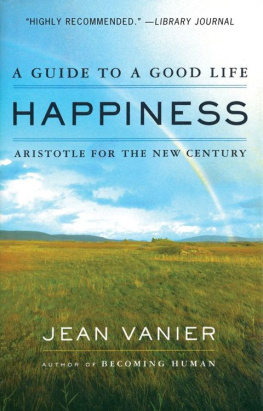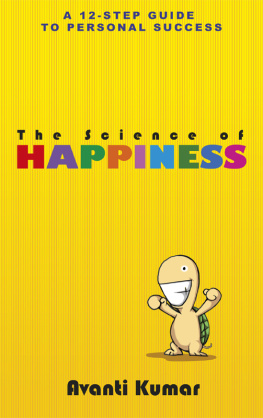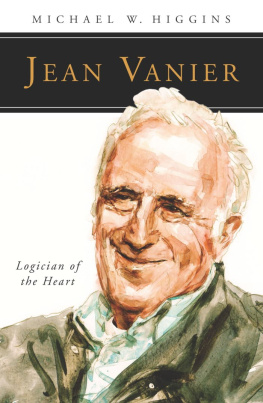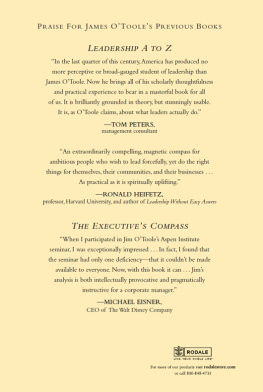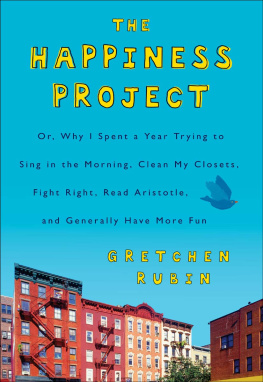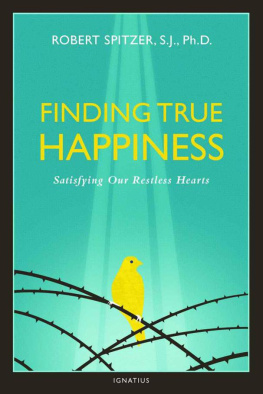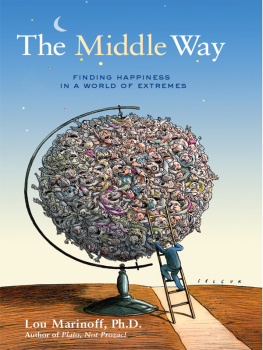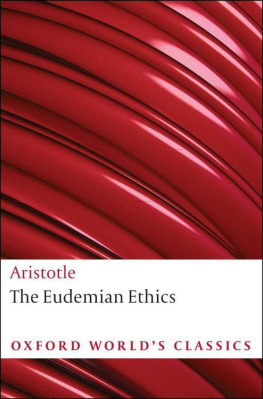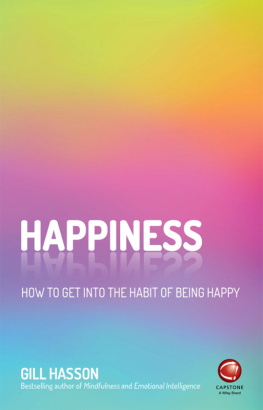HAPPINESS
Copyright 2001, 2011 by Jean Vanier
English-language translation copyright 2001, 2011 by Kathryn Spink
All Rights Reserved. No part of this book may be reproduced in any manner without the express written consent of the publisher, except in the case of brief excerpts in critical reviews or articles. All inquiries should be addressed to Arcade Publishing, 307 West 36th Street, 11th Floor, New York, NY 10018.
Arcade Publishing books may be purchased in bulk at special discounts for sales promotion, corporate gifts, fund-raising, or educational purposes. Special editions can also be created to specifications. For details, contact the Special Sales Department, Arcade Publishing, 307 West 36th Street, 11th Floor, New York, NY 10018 or .
Arcade Publishing is a registered trademark of Skyhorse Publishing, Inc., a Delaware corporation.
The author wishes to thank the publishers and copyright holders of the cited texts for permission to reproduce their materials.
Originally published in Canada by House of Anansi Press Limited
Visit our website at www.arcadepub.com .
10 9 8 7 6 5 4 3 2 1
Library of Congress Cataloging-in-Publication Data is available on file.
ISBN: 978-1-61145-497-0
CONTENTS
ABBREVIATIONS
NE Nichomachean Ethics
EE Eudemian Ethics, Aristotles first ethical treatise which is appreciably similar to the Nichomachean Ethics
Pol. Politics
Meta. Metaphysics
Phys. Physics
De Gael. De Caelo ( On the Heavens )
Rhet. Rhetoric
Top. Topics
Poet. Poetics
De Part. De Partibus Animalium ( On the Parts of Animals )
De Div. De Divinatione per Somnum ( On Prophesying by Dreams)
NOTE
Aristotle refers exclusively to man, and there are times when, in order to avoid making the text too heavy, I too have used the word man in the generic sense. In Aristotles day, men were considered to be superior to women. Therein lies one of the shortcomings of his ethics. Today we would refer more readily and appropriately to human beings, people, or men and women.
INTRODUCTION
Happiness, whatever else people may say, is the great concern of our life. A brief inquiry will easily bear this out. We would only have to ask people rushing to work, strolling about the streets, or chatting over a drink, What are you looking for in life? Some might say, success at work, promotion; others, marriage, starting a family or a peaceful life without conflict, or a salary increase, a holiday in the sun, a good time with friends. But if we were to press them further, Why do you want to be successful, earn a salary increase, start a family, or have an enjoyable holiday? their answer would no doubt be, Because it would make me happy.
To be happy, to know happiness, is the great desire of every man and woman. We may differ perhaps in the means by which we attain happiness, but we all want to be happy. That is our great aspiration.
Caught up as we are in the business of living and our various activities, it is true that we do not often ask ourselves, Why am I doing this, what am I looking for? Yet this is the unavoidable question about the meaning of life. And as soon as we ask ourselves that question, we start to philosophize.
Why is a human being created? For what happiness? That is the question the Greek philosophers posed, the question the Jewish people asked, the question central to Jesus message in the Beatitudes. It is the question that has existed in the hearts of men and women of all times, backgrounds, races, and religions. It is humanitys eternal question.
Aristotle is one of the great witnesses to this quest for happiness. His thinking was not that of an ideologue, but based on human facts and personal experience. That was what led him to propound his ethics of happiness in order to help people to look more clearly into themselves and to find their own fulfillment. He did so 2,400 years ago, but his thinking spans the centuries and is still relevant to us today.
Aristotle believes in human intelligence. He is convinced that what distinguishes human beings from animals is the capacity to think, to know and analyze reality, to make choices, to orient our lives in one direction or another. He does not accept that we are merely a collection of predestined desires or impulses. He thinks that each of us is, to a greater or lesser extent, master of our own life and destiny.
Aristotle does not, however, seek merely to reiterate moral axioms. Nor does he wish to prompt people by external means to be just, to seek the truth, and to obey laws. What he wants to do is lay the foundations of a moral science with thinking that stems from humanitys deep desires. His fundamental question is not What ought we to do? but What do we really want? His ethics are not those of law. Rather, they look closely at humanitys deepest inclinations in order to bring them to their ultimate fulfillment. Aristotles ethics are not therefore based on an idea but on the desire for fullness of life inscribed in every human being.
Aristotles ethics require that we work on ourselves. We might be disappointed that they do not provide us with the clear moral guidelines for action that we are seeking, or with the principles that we might expect ethics to propound. Instead Aristotle invites us to look for and discern those guidelines within ourselves. What is your deepest desire, hidden perhaps beneath other, more superficial desires? It is for us to work that out.
Aristotles thinking is not without its limitations, and we shall look at those in the conclusion to this book. He is often criticized for being too comfortable with slavery and the subordination of women. In his defence, we should bear in mind that nearly two and a half millennia separate him from us. The interim years have seen the birth of Christianity, the emergence of big cities, all the discoveries of science, and an extraordinary evolution in the way in which men and women live. All this has led human beings to new discoveries about themselves and the roles of men and women. Women are no longer as in Aristotles day, when infant mortality was high completely tied to the task of giving birth to children and looking after the family. Women can now more readily take their place in society, without neglecting their role as mothers in the process.
If there are deficiencies in Aristotles thinking, there are also things of significant value. He wants to take into account the whole of human reality, not to create a system of ethics that is purely ideological. His ethics integrate the dimensions of the body and affectivity, as well as that of pleasure. They afford friendship a generous place, for Aristotle is convinced that it is impossible to be happy all on ones own: For without friends no one would choose to live (NE 1155a3). In a broader sense, happiness has a social or civic dimension. The man who wishes to be fully human cannot remain a stranger to city life.
It is this profound sense of reality and human reality that has always interested me about Aristotle, and well before the foundation of lArche. When I was thirteen, I entered a British naval school. It was wartime and I wanted to serve in the armed forces against the grave threat of Nazi power. I left the navy eight years later because I had begun to ask myself the question, Is this really what I want to do with my life? I had allowed myself to be drawn into the navy for the commendable reason of serving my country. I left the navy because of a deeper questioning: What do I want to do with my life? What will make me a fully accomplished man?
My departure from the navy led me to seek the meaning of life in my Christian faith, in Jesus message of peace and his vision of humanity. I also sought answers from philosophers, and from wise men and women who were convinced of the beauty and value of human beings. That was how I came across the works of Aristotle.
Next page
